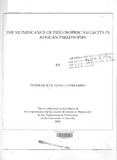| dc.description.abstract | The gist of the tudy revolves round the question of the nature of African philosophy. The controversy and debate over the nature of African philosophy was generated by the celebrated (though to some, stigmatised) work of Placide Tempels, Bantu Philosophy. The work, written in Dutch and translated into French in 1945, was not translated into English until 1959.
Before the publication of Tempels' work, Africans were in many circles (some very high indeed) considered to be a people incapable of rigorous and dialectical inquiry. The existence of African philosophy was therefore as a logical move denied. It is against this background that most Africanist scholars in philosophy conceive of Tempels' work as monumental. For such scholars the work refutes, or at least casts some doubt on, what this thesis refers to as the conventional European conception of the African mentality, that is, the conception that doubts the African'sability to engage in any rational activity.
This study has analysed and invalidated the conventional conception. It has found that the basis of the much-eulogised European philosophy is to be found in ancient Egypt, not Greece. That the cradle of western civilization is traceable to ancient Egypt. And further, that ancient Egypt was very much part of Africa and not part of Europe or Asia as some scholars contend.
This study explicates and analyses some approaches (or trends as some prefer to call it) in contemporary African philosophy. In particular, it lays emphasis on three approaches namely; philosophy, professional philosophy and specifically philosophic sagacity. Of these three, the study finds that it is the last one that offers a genuine and non-controversial approach to African philosophy.
The main thrust of the work is a comparative analysis of ancient Greek thought (Specifically the per-Socratic thought) and African philosophic sagacity. The findings are that the two thought systems do not differ much in terms of rationality and logical incisiveness. The general conclusion of the study is therefore that, if the
former is philosophical (and no one ever doubts this), then it is only logically fair and fitting for the latter to be so-considered.
This work is particularly a contribution to philosophic sagacity in Africa, and also pioneering in the comparative study of thoughts of indigenous Africans and Western thought. | en |

